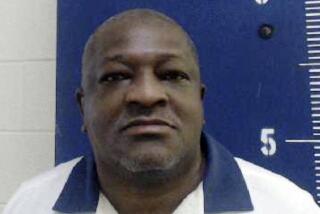Ohio execution: New drug protocol, but 15 minutes to die
Convicted murderer and rapist Dennis McGuire took more than 15 minutes to die, appearing to gasp during his execution Thursday by Ohio using a combination of drugs never tried before in the United States.
The process, using a two-drug protocol, is the latest attempt by states seeking a way to execute prisoners in a constitutionally approved manner that avoids cruel and unusual punishment. The issue has been complicated because the manufacturer of a drug previously used made it unavailable for use in capital punishment.
According to a pool report from journalists who witnessed the execution at the Southern Ohio Correctional Facility in Lucasville, McGuire took more than 15 minutes to die and made “several loud snorting or snoring sounds.”
McGuire’s attorney, federal public defender Allen Bohnert, called the death “a failed, agonizing experiment by the state of Ohio.”
In keeping with its policy, the Ohio Department of Rehabilitation and Correction announced only the time of death, 10:53 a.m. McGuire was sentenced to death for murdering Joy Stewart, 22, in 1989. Stewart was about 30 weeks pregnant.
According to the Death Penalty Information Center, a national nonprofit, most states until 2010 used a three-drug combination to execute criminals: an anesthetic; a paralyzing agent and a chemical to stop the heart. But drug shortages and pressure from death-penalty opponents have forced some manufacturers to pull back and that has led some states to seek different ways to carry out death sentences.
Eight states have used a single lethal dose of an anesthetic and five other states have announced they will use that protocol, but have yet to execute anyone. About 20 states have used or planned to use pentobarbital, one of the drugs that was commonly used in the three-drug protocol.
But Ohio announced in September that it, like some other states, had run out of pentobarbital. The state said it will become the first in the nation to try a two-drug protocol, midazolam, a sedative, and hydromorphone, related to morphine.
McGuire’s attorneys had attempted to halt his execution last week, arguing the untried method put him at substantial risk of “agony and terror” during the execution. The state during court proceedings argued that though the Constitution protects from cruel punishment, that may not mean a completely comfortable death.
“You’re not entitled to a pain-free execution,” Assistant Atty. Gen. Thomas Madden said in court.
According to the Associated Press, McGuire made loud snorting noises during one of the longest executions since Ohio resumed capital punishment in 1999.
Strapped to a gurney in the execution chamber, McGuire thanked Stewart’s family for their “kind words” in a letter he apparently received from them.
“I’m going to heaven, I’ll see you there when you come,” he said through a microphone held by the warden.
As his adult children sobbed a few feet away in a witness room, McGuire opened and shut his left hand as if waving to his daughter, son and daughter-in-law.
More than a minute later he raised himself up, looked in the direction of his family and said, “I love you. I love you” — his words audible even though the microphone had been removed.
McGuire was still for almost five minutes, then emitted a loud snort, as if snoring, and continued to make that sound over the next several minutes. He also soundlessly opened and shut his mouth several times as his stomach rose and fell.
“Oh my God,” his daughter, Amber McGuire, said as she observed her father’s final moments, the wire service reported.
Bohnert, McGuire’s attorney, said concerns about the manner of death had been confirmed by the sounds and the length of time it took for him to die.
“And more importantly, the people of the state of Ohio should be appalled at what was done here today in their names,” said Bohnert, who did not witness the execution.
The state announced the new method of execution in October and had planned to use it for the execution of Ronald Phillips, 40, who was scheduled to die in November for killing a 3-year-old girl.
However, Gov. John Kasich delayed that execution to allow time to study whether the state could meet Phillips’ request to donate his organs.
ALSO:
Last year’s U.S. weather showed extremes in precipitation
New Mexico school reopens, two days after shooting by 12-year-old
Suspect in theater shooting allegedly confronted another moviegoer
More to Read
Start your day right
Sign up for Essential California for news, features and recommendations from the L.A. Times and beyond in your inbox six days a week.
You may occasionally receive promotional content from the Los Angeles Times.






